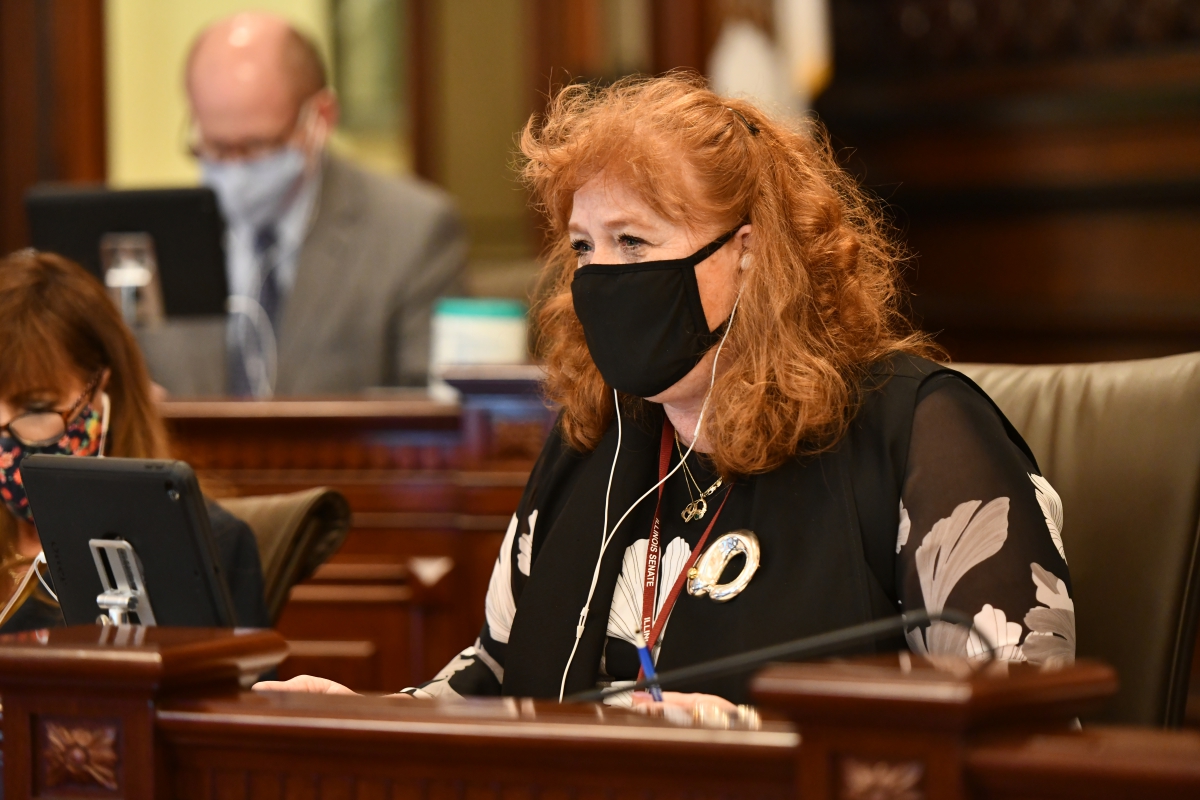- Details
- Category: Senator Julie A. Morrison News
 SPRINGFIELD – To help protect the lives of young children with food allergies, State Senator Julie Morrison (D-Lake Forest) championed a measure in the Senate that would create an anaphylactic policy for schools and day cares.
SPRINGFIELD – To help protect the lives of young children with food allergies, State Senator Julie Morrison (D-Lake Forest) championed a measure in the Senate that would create an anaphylactic policy for schools and day cares.
“Children spend most of their day at school, and both they and their parents deserve the peace of mind that comes with knowing that schools are well-equipped to assist when a student is having an allergic reaction,” Morrison said. “Creating a plan and training more employees on what to do if a student is having a reaction will save lives.”
Read more: Morrison leads measure to prepare schools for serious allergic reactions
- Details
- Category: Senator Meg Loughran Cappel News

SHOREWOOD – Legislation that would end the practice of burdening family members of deceased utility customers with early termination fees unanimously passed the Senate Wednesday.
State Senator Meg Loughran Cappel (D-Shorewood) is the lead Senate sponsor of the measure.
“Grieving families have enough on their plate without having to worry about being saddled with wrongful utility fees,” Loughran Cappel said. “Ending the practice of charging next of kin in the event of an untimely death is a simple solution that I am proud to support.”
House Bill 122 would end early termination fees for utility customers who die before the end of a contract.
- Details
- Category: Senator Adriane Johnson News
SPRINGFIELD – Following a recommendation by the U.S. Preventive Services Task Force to lower the recommended age to start screening for colon and rectal cancers, the Illinois Senate approved legislation sponsored by State Senator Adriane Johnson (D-Buffalo Grove) to require insurance companies to cover medically necessary colonoscopies.
“Preparing for a colonoscopy can be nerve-wracking, but it’s worth the stress: A colonoscopy can detect, or even prevent, cancer,” Johnson said. “Cost shouldn’t be a barrier to anyone who needs this potentially life-saving procedure.”
The legislation would require health insurance companies to cover the cost of a colonoscopy that has been deemed medically necessary after an initial screening. Patients would not be charged a deductible, coinsurance, copayment or other cost-sharing requirement for the procedure.
Read more: Senate approves Johnson plan to require insurance to cover colonoscopies
- Details
- Category: Senator Laura Ellman News
 SPRINGFIELD – Legislation sponsored by State Senator Laura Ellman (D-Naperville) that would allow students to use 529 college savings accounts for other education-related purposes without additional taxation passed the General Assembly on Thursday.
SPRINGFIELD – Legislation sponsored by State Senator Laura Ellman (D-Naperville) that would allow students to use 529 college savings accounts for other education-related purposes without additional taxation passed the General Assembly on Thursday.
“This legislation would allow college savings plans to be used in more ways to reflect the realities of modern-day higher education,” Ellman said. “Students need and should be able to use their savings plans to pay for loans or job-training programs.”
- Details
- Category: Senator Robert Martwick News
SPRINGFIELD – State Senator Robert Martwick (D-Chicago) passed legislation out of the Illinois Senate Thursday to ensure the mental health needs of school children are met.
House Bill 576 gives students the opportunity to take days off school to focus on their mental health without facing disciplinary action. The proposal comes as suicidal thoughts and mental health struggles among teens continues to rise. According to the Centers for Disease Control and Prevention, rates of suicide in young people increased 56% from 2007 to 2017.
“Students experiencing mental health struggles need to know that they will not be disciplined for attending to their mental health.” Martwick said. “Giving students the opportunity to make up their work allows them to stay on track and not feel the pressure of falling behind.”
Read more: Martwick measure providing students with mental health days passes Senate
- Details
- Category: Senator Tom Cullerton News

SPRINGFIELD – To combat social isolation for residents of long-term care facilities, State Senator Tom Cullerton (D-Villa Park) passed a measure to require these facilities to help connect residents to loved ones when a disaster is declared.
“The COVID-19 pandemic put an unprecedented amount of stress on people, especially those in long-term care facilities,” Cullerton said. “A simple phone or video call could do a lot for these residents who are isolated from their loved ones.”
According to a report from the National Academies of Sciences, Engineering, and Medicine, more than one-third of adults aged 45 and older report feeling lonely, and nearly one-fourth of adults aged 65 and older are considered to be socially isolated. COVID-19 has only exacerbated these statistics.
Read more: Cullerton passes measure to connect long-term care facility residents with family
- Details
- Category: Senator Meg Loughran Cappel News
SHOREWOOD – A piece of bipartisan legislation, led by State Senator Meg Loughran Cappel (D-Shorewood) and State Representative Mark Batinick, that would expand the period of time in which school zone speed limits are active passed the Senate unanimously Wednesday.
“Prioritizing the safety and wellbeing of our students is a choice,” Loughran Cappel said. “I am proud my colleagues in the General Assembly took it upon themselves to give our kids the additional protections they deserve.”
Under current school speed zone rules, children are to be assumed present between the hours of 7 a.m. and 4 p.m. However, Plainfield-area high schools begin classes at 7:05 and students arrive during a timeframe when school zone rules are not yet active. Additionally, numerous students arrive before 7 a.m. to attend before school programs, tutoring or other extracurricular activities.
Read more: Senate approves Loughran Cappel legislation to expand school zone times
- Details
- Category: Senator Laura Murphy News
SPRINGFIELD – More students will be able to represent their schools comfortably and confidently under a measure sponsored by State Senator Laura Murphy (D-Des Plaines) to give students more flexibility in the design of their athletic uniforms, which has passed both chambers of the Illinois legislature.
“Some athletic uniforms can be a barrier to students who want to compete for their school. The simple addition of long sleeves, leggings or a head scarf can make all the difference for diversity and inclusion on the team,” Murphy said. “The passage of this legislation shows kids across the state that we stand with them—no matter their background.”
Murphy’s proposed legislation would enable student athletes at public K-12 schools, colleges and universities, and community colleges in Illinois to modify their athletic or team uniform to be in accordance with their cultural values, modesty standards or religion.
Read more: Students could modify athletic uniforms for modesty, comfort under Murphy legislation
More Articles …
- Morrison: People with gluten sensitivity should feel protected when visiting a pharmacy
- Johnson moves to eliminate racist restrictive covenants once and for all
- Van Pelt’s bill to expand birthing center licenses passes Senate
- Senator Holmes: Illinois should forbid poaching and trafficking of at-risk animal species
Page 472 of 762

















 © 2026 Illinois Senate Democratic Caucus
© 2026 Illinois Senate Democratic Caucus